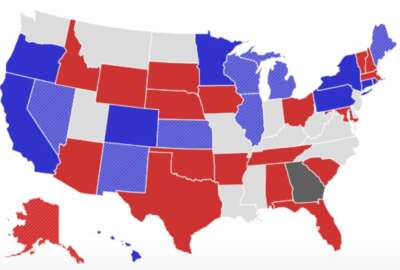

Georgia's major IT enterprise outsourcing program celebrated its 10th anniversary thanks to state CIO Calvin Rhodes' turnaround efforts. Will he be rewarded by a...
In the mid 1990s, stimulated by a thought provoking new book, “Reinventing Government: How the Entrepreneurial Spirit is Transforming the Public Sector,” by my old friend Ted Gaebler and his colleague David Osborne, government agencies across the country embarked upon significant privatization initiatives.
Indianapolis Mayor Stephen Goldsmith was a leader in this effort and even coined the term “Yellow Pages Test”: If three or more companies offered a service that government performed, that function should be put out to bid in an effort to make delivery more efficient and effective – better service at a lower cost.
In many corners privatization actually became a controversial term, euphemisms began to spring up so as not to automatically engender opposition. One thing did not change and that was the underlying economical principle – competition, and the process in the public sector became known as “competitive government.”

Privatization was not a totally new phenomenon as government operations had always had private sector partners throughout history. However, the new strategy was aimed at more extensive and more comprehensive targets, especially in IT infrastructure, e.g., data centers, networks or internal systems development, traditionally managed and performed by government employees.
While similar outsourcing initiatives have been adopted around the country over the years, few have been as significant as those in Georgia, which this year will celebrate a decade of its initiative called the Georgia Enterprise Technology Services (GETS) program. I discussed the Peach State’s experience with Calvin Rhodes, executive director of the Georgia Technology Authority and state chief information officer who oversees GETS.
In 2007 under the direction of former governor and current United States Secretary of Agriculture, Sonny Perdue, Georgia decided that its problematic enterprise IT operations could best be served by a private sector provider awarded through a competitive bidding process.
In doing so, Georgia joined only a handful of other large local governments and states that attempted a similar path – San Diego County, California; Minneapolis, Texas, Virginia and Connecticut, with mixed results.
I tried as CIO in both Massachusetts and California, and while we were able to get both states out of the telephone business, our data center outsourcing was less successful. Or was it?
In California, we had an independent review of our massive $500 million, 1,000 employee, multiple data center environment, focused on consolidation and outsourcing potential in 1996. Our consultants told us that we could have significant savings by consolidation, but outsourcing would not be as financially attractive because during the nine-month review the data centers had reduced their chargeback rates — the rates the data centers charged agencies to run their business applications — by 20%. We pursued consolidation — though it took another 10 years — and claimed an immediate $100 million savings. I was sold on competitive government.


Deal appointed Rhodes state CIO and rather than pull back from the effort, terminating the contract, he charged Rhodes with getting project up and running successfully.
“When the Deal administration arrived in 2011 the project was having some difficulties. And I think that’s one of the reasons they thought the effort needed to have some business skill sets brought to make decisions,” Rhodes said. “GTA needed to chart a new course towards actually improving some of the services that agencies weren’t real happy with at that point.”
Obviously, any government consolidation, especially one combined with outsourcing involves a huge cultural change, not an insignificant challenge. Rhodes anticipated some skepticism and said he realized that while he had to focus on the technology concerns, he was also really trying to work with the employees, “making sure they knew that the planned course of direction that they were thrust into was the targeted course that the new Deal administration wanted.”
Such initiatives unsurprisingly sent a shiver up the spine of public sector labor unions everywhere they existed. That was my experience in Massachusetts and California. Rhodes confirmed that impression when I asked why more states haven’t adopted Georgia’s outsourcing model.
“Well, probably a number of different reasons, but I think the fact that Georgia is more of a right to work state, it was easier making a pretty drastic change to a model where we did not have labor unions concerned about someone to moving from a state payroll to one of the service providers’ payrolls,” he said.
Rhodes emphasized that Georgia tried to make sure that impacted employees had a soft landing with other organizations. A good number of those individuals, if they have not retired, are still with those organizations. The other major hurdle Rhodes identified to enterprise IT outsourcing is the skill set involved.
“It is really a different model and requires a different set of capabilities to manage those providers,” he said. This was particularly true as Georgia moved in to more of a multi-vendor arrangement a few years ago with a multi-sourcing service integrator, Capgemini, overseeing the various vendor teams.
According to Rhodes, the Georgia model has demonstrated its early vision: Better, faster, cheaper. Georgia elected a new governor last November, Brian Kemp, a Republican like his predecessor; however as we have discussed in a previous column, that does not ensure reappointment. Rhodes has been working closely with Governor Kemp’s team since the transition began for the new administration, and he is pleased to continue to serve at the pleasure of the governor.
With the successful turnaround of the largest state outsourcing initiative in the country under Rhodes leadership, his case for continued service is a strong one. Also, it will be interesting to see if such success at the Georgia Technology Authority may spur similar efforts nationwide.
Copyright © 2025 Federal News Network. All rights reserved. This website is not intended for users located within the European Economic Area.
